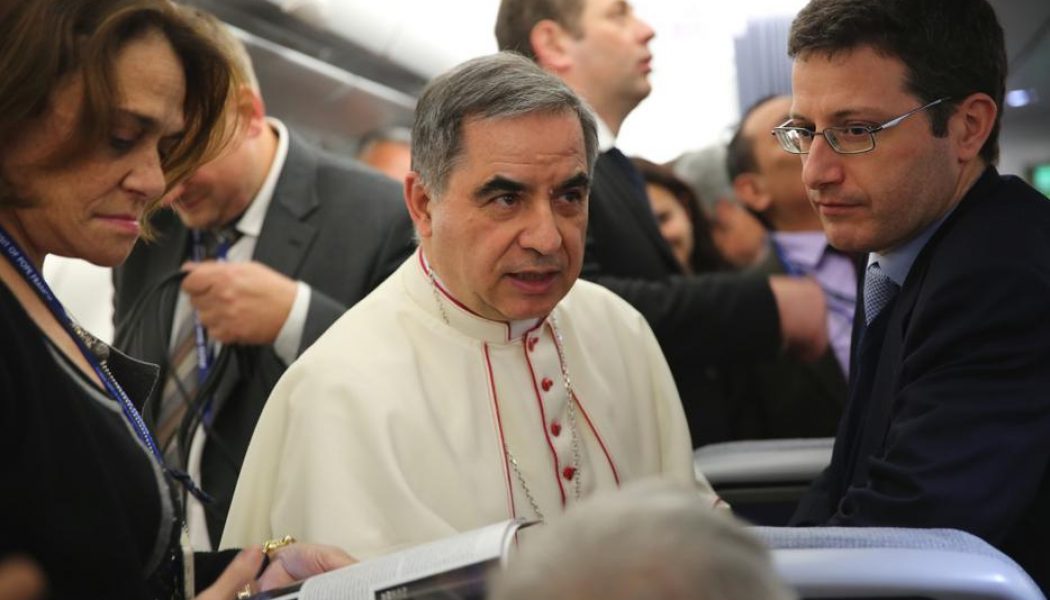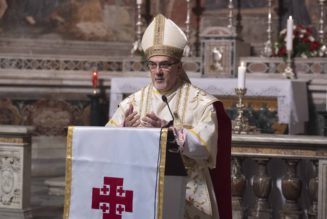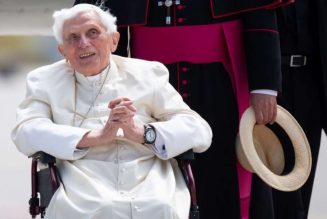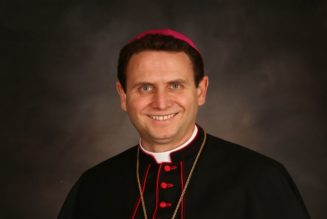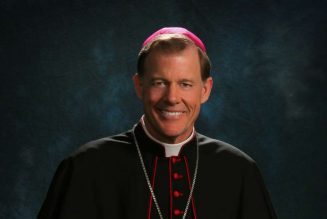
VATICAN CITY — Cardinal Angelo Becciu, who until today was prefect of the Vatican’s Congregation for the Causes of Saints, has resigned from that office, and in an extremely rare move, from the rights extended to members of the College of Cardinals.
The cardinal worked previously as the number two-ranking official in the Vatican’s Secretariat of State, and has been connected to an ongoing investigation of financial malfeasance at the secretariat.
A statement from the Holy See press office Thursday said: “Today, Thursday, Sept. 24, the Holy Father accepted the resignation from the office of Prefect of the Congregation for the Causes of Saints and related rights of the Cardinalate, presented by His Eminence Cardinal Giovanni Angelo Becciu.”
Cardinal Becciu remains technically a cardinal, and the Vatican’s announcement did not specifically delineate what rights Cardinal Becciu has resigned. In 2015, Pope Francis accepted a similar renunciation from Scottish Cardinal Keith O’Brien, who in 2013 admitted to serial sexual misconduct. Cardinal O’Brien did not subsequently attend public eccleiastical events, and was ineligible to participate in a future papal conclave. The Vatican press office could not be reached for comment Thursday evening.
The cardinal himself has not yet responded to a request for comment from CNA.
The move was unexpected, and does not seem to have been long planned. Cardinal Becciu had been scheduled to preside over the beatification of Ven. Carlo Acutis, which will take place in Assisi Oct. 10.
Cardinal Becciu served as “sostituto,” or second-ranking official at the Secretariat of State, from 2011 to 2018, when Pope Francis named him a cardinal and moved him to the Congregation for the Causes of the Saints. During his tenure in that position, he was linked to a number of financial scandals, most recently the Secretariat’s investment of hundreds of millions of euros with the Italian businessman Rafaelle Mincione and the controversial purchase of a London building.
CNA has previously reported that a substantial part of the $200 million used to finance the Secretariat of State’s purchase of a luxury development at 60 Sloane Avenue came through credit extended by BSI, a Swiss bank with a long track record of violating money-laundering and fraud safeguards in its dealings with sovereign wealth funds.
CNA has also reported that in 2015 Cardinal Becciu seemed to have made an attempt to disguise the loans on Vatican balance sheets by cancelling them out against the value of the property purchased in the London neighborhood of Chelsea, an accounting maneuver prohibited by new financial policies approved by Pope Francis in 2014.
The alleged attempt to hide the loans off-books was detected by the Prefecture for the Economy, then led by Cardinal George Pell. Senior officials at the Prefecture for the Economy told CNA that when Cardinal Pell began to demand details of the loans, especially those involving BSI, then-Archbishop Becciu called the cardinal in to the Secretariat of State for a “reprimand.”
Cardinal Becciu has previously defended the London investment as “accepted practice,” despite Vatican prosecutors staging raids on the offices of several of Becciu’s closest collaborators in the Secretariat, and despite the arrest of one of the businessmen involved.
CNA has also reported that Cardinal Becciu was involved in a complicated series of events and financial transactions around the purchase of the Istituto Dermopatico dell’Immacolata (IDI), an Italian hospital that collapsed in 2013 under 800 million euros of debt through theft and fraud.
In 2016, Cardinal Becciu was instrumental in bringing to a halt Vatican financial reforms initiated by Cardinal George Pell. Although Pope Francis had given the newly created Prefecture for the Economy autonomous oversight authority over Vatican finances, Cardinal Becciu interfered when the prefecture planned an external audit of all Vatican departments, to be conducted by the firm PriceWaterhouseCooper.
Unilaterally, and without permission of Pope Francis, Cardinal Becciu cancelled the audit and announced in a letter to all Vatican departments that it would not take place.
When Cardinal Pell challenged internally the audit’s cancellation, Cardinal Becciu persuaded Pope Francis to give his decision ex post facto approval, sources inside the prefecture told CNA. The audit never took place.
In 2017, Cardinal Becciu was also responsible for the dismissal of the Vatican’s first-ever auditor general, Libero Milone.
Milone was fired in dramatic fashion by Cardinal Becciu, who accused the auditor of “spying” on the finances of senior officials, including Cardinal Becciu. The then-Archbishop Becciu threatened criminal prosecution of Milone if he did not agree to leave his Vatican office quietly.
Milone maintained that he was fired for being too good at his job, and because he and the reforming work of the Prefecture for the Economy were perceived as a threat to the autonomy and business practices of long-time Curial officials. He said that he was dismissed on trumped-up charges after he uncovered evidence of financial misconduct under Cardinal Becciu’s leadership.
Also in 2017, Cardinal Becciu was involved in a complicated chain of events with the Sovereign Military Order of Malta that ended with the Grand Master of the Order being deposed, and Becciu being installed as special papal envoy charged with running the order.
At the center of that controversy were allegations that Vatican financial authorities had siphoned off more than 30 million euros from a 120 million euro bequest held in a Swiss bank account, in order to ease liquidity problems.
In February 2017, Pope Francis named Cardinal Becciu as his personal delegate to oversee the “spiritual and moral” reform of the Order of Malta, with particular attention to the professed members. It is unclear if he will continue in the role.
Pope Francis created Cardinal Becciu a cardinal on June 28, 2018. He was appointed prefect of the Congregation for the Causes of Saints on Aug. 31, 2018.
